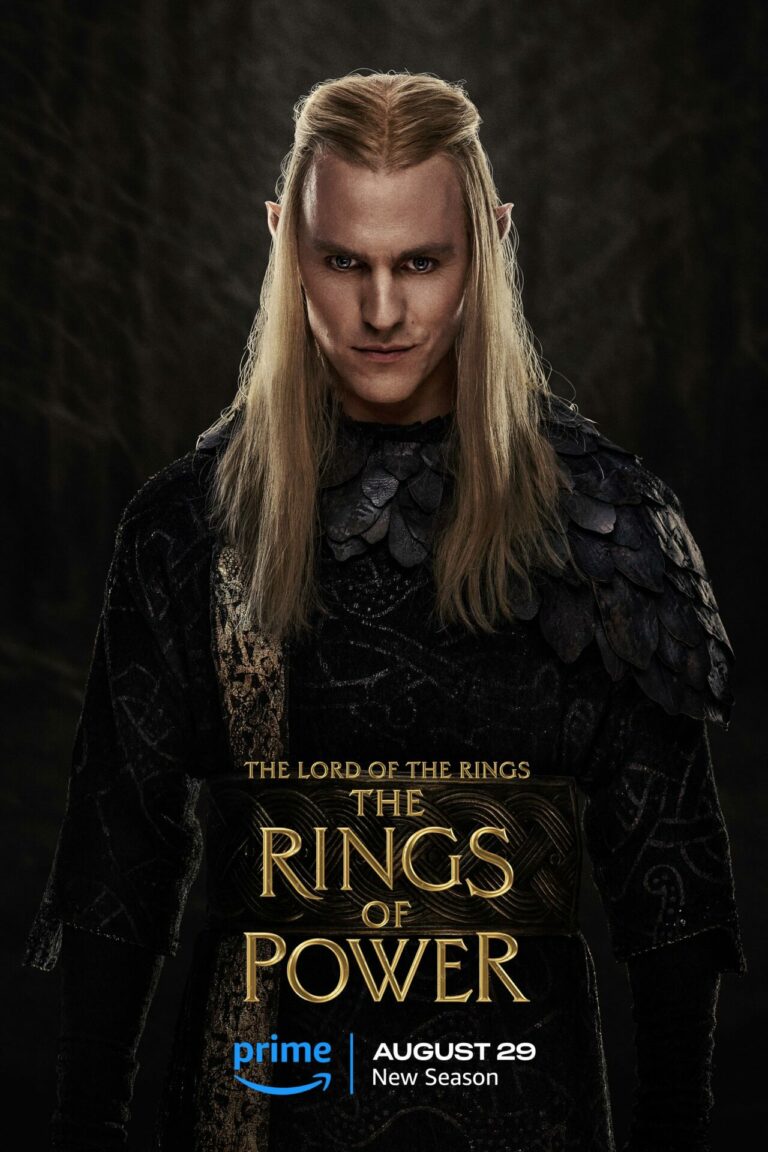“Power Corrupts”

| None | Light | Moderate | Heavy | |
|---|---|---|---|---|
| Language | ||||
| Violence | ||||
| Sex | ||||
| Nudity |
What You Need To Know:
The dialogue and character development for Episode Five of RINGS OF POWER: Season Two are superbly written and portrayed. Episode Five neatly brings out the Christian, biblical, moral themes in LORD OF THE RINGS. For example, it warns viewers that power tends to corrupt but urges them to courageously oppose evil with faith and values. There’s even a scene in Episode Five that warns against power-hungry rulers and higher taxes.
Content:
Very strong Christian, moral worldview supports faith and values against evil, promotes liberty (including religious liberty and putting positive spiritual values at a high level) and opposes tyranny, religious persecution and greedy, power-hungry rulers who create unjust taxes and try to extort other leaders, but there’s an appeal to God’s angelic hosts instead of overtly appealing to God;
No foul language;
A struggle and brief swordfight occurs, a character is stabbed in the back deceitfully, a large anvil falls and almost kills a few characters, a character is forcibly arrested and falsely accused, an evil king’s son purposely breaks a religious relic, a character has a vision of destruction, a scary army of orc creatures marches on an elven city, woman uses a small knife to threaten a villain;
No sex;
No nudity;
A toast is offered;
No smoking or drugs; and,
Main villain uses deceit, lies, manipulation, cunning, and flattery to get others to do his evil will, he also beguiles and seduces them, and he cunningly capitalizes on and corrupts their desires.
More Detail:
The dialogue and character development for Episode Five are superbly written, performed and displayed. They neatly bring out the Christian, biblical, moral themes in Tolkien’s work, which arguably reached their apex in his magnum opus THE SILMARILLION.
For example, the power of the ring given to King Durin IV in RINGS OF POWER corrupts his character. As his son, Prince Durin III, notes, his father never was a greedy man until he put on the ring. King Durin’s newfound greed comes to terrible fruition in the next episode.
THE SILMARILLION is an historical epic that reaches far back into time, to God’s creation of the angels, the universe and Earth. Sauron is the main assistant and successor to a powerful, satanic, duplicitous supernatural being named Melkor and Morgoth. Eventually, the angels siding with the Creator God imprison Morgoth in the Void beyond the material universe until the Final Judgment. Like his mentor, Sauron is prideful and deceitful. Also, he lusts for power and desires to replace God. As a fallen angelic being, he’s able to assume many forms and make himself appear noble and beautiful. As such, he can tempt and delude lesser beings, like Lord Celebrimbor, by deceptively corrupting their desires and taking advantage of their flaws, such as pride and selfishness.
The scenes between Sauron and Celebrimbor in Season Two, Episode Five of RINGS OF POWER deftly capture this, even though the artists behind RINGS OF POWER legally don’t have access to using THE SILMARILLION. They do have access, however, to the six appendices of THE LORD OF THE RINGS, which include enough details about Sauron’s background and history. That said, RINGS OF POWER compresses some of the historical events mentioned in the six appendices, down from 100 years and 20 years to only a few. It also conflates the crafting of the rings of power by Sauron and Celebrimbor, which take place over 100 years, with what happens when the new king of Númenor cracks down on his political opponents, which actually occurs more than 1600 years after the rings of power are crafted.
Thus, in Episode Five, Lord Celebrimbor realizes that Sauron, disguised as Annatar, enjoys planting thoughts in other people’s minds and making them think that the thoughts are theirs. Sauron as Annatar appeals to Celebrimbor’s compassion when he tells him that men need rings of power to defend themselves against the great evils rising from the Land of Mordor, “where the Shadows lie.” Celebrimbor notes that men are easily corrupted. Annatar partly agrees but points out that, when Darkness falls, there are great men who rise to oppose and defeat the Darkness. He proposes that they could give the nine rings only to men they can trust, “the wisest, the most noble, the purest of heart.” When Celebrimbor still refuses to make nine rings of power for men, Annatar pleasantly retreats, but then says as he leaves that he’ll make the rings for men himself, without Celebrimbor’s help.
Meanwhile, in the island kingdom of Númenor, a powerful and wealthy man named Ar-Pharazôn seizes the throne from the blind Queen Míriel and starts to persecute “the Faithful,” the people who still worship God and revere His angels, whom they call the Valar. Pharazôn is jealous of the immortality of the Elves, the immortality that God and the Valar withhold from men. The Faithful still support the Queen, which gives the evil king another reason to persecute them. He and his son also strip the Sea-Guard, the leaders of the Queen’s navy, of their rank and power. However, the bravest and strongest naval captain, Elendil, the father of Isildur, who becomes a great king of his own, begins to resist the evil king.
At the same time, the dwarf-lord of Khazad-dûm, King Durin III, becomes so greedy that he even levels a new tax on his people. He calls it a “ring tribute.” He also tries to blackmail the other six dwarf-lords into giving him a great portion of their treasure in return for the other six rings of power. The king wants to use his ring of power to dig for gold in the bowels of his mountain kingdom. However, his son warns him that the son’s wife has discovered that the digging has awakened a nameless, ancient evil.
Thus, Episode Five of RINGS OF POWER: Season Two not only warns viewers about the deceitful snares of demonic evil. It also warns viewers that power tends to corrupt and absolute power corrupts absolutely. There’s even a scene in Episode Five that warns against power-hungry rulers and higher taxes. However, Episode Five of RINGS OF POWER: Season Two also urges viewers to courageously oppose evil with faith and values.
There is some violence in Episode of RINGS OF POWER: Season Two. Also, the orc army threatening the elf city is rather scary. So, caution is advised for older children.


 - Content:
- Content: 
